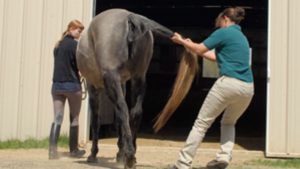ProMed mail reports in some of the drier parts of inland Australia (quite removed by distance from Bairnesdale in Victoria), there is a wild legume (_Indigofera_ spp.) containing the toxin indospicine. This plant tends to be more abundant during the wetter seasons in the desert country and/or is a more preferred food of some herbivores at these times.
 This toxin can accumulate in the offal and musculature of monogastric
This toxin can accumulate in the offal and musculature of monogastric
herbivores (e.g., horses). If said meat from such animals finds its
way into pet food and forms a substantial proportion of the pets’ diet, it causes a non-responsive acute hepatitis.
Indospicine in the diet of equines also causes chronic liver disease and a hepatic encephalopathy condition commonly referred to as “walk-about” disease (not to be confused with the condition of similar cause arising from consumption of hepatotoxic _Crotolaria_ spp. By horses in the wetter tropics and sub-tropics). Affected horses compulsively pace or walk, initially causing dumping of the toes of the hooves (especially rear) and progressive loss of coordination with
progression to head pressing and, ultimately, death. Feral horses (of which there are sizeable numbers scattered over the drier inland areas of Australia) and domesticated horses showing early signs of walk-about disease are more likely to find their way to knackeries.
This condition was researched and established in Alice Springs by Dept of Primary Industries and Fisheries and a local private veterinary clinic (in collaboration with CSIRO, Long Pocket Research Station in Brisbane, Qld.) in the early-mid 1980s after a run of very good seasons in the central Australian deserts, and seasonal occurrence of acute, non-responsive, fatal hepatitis affecting pet dogs.
